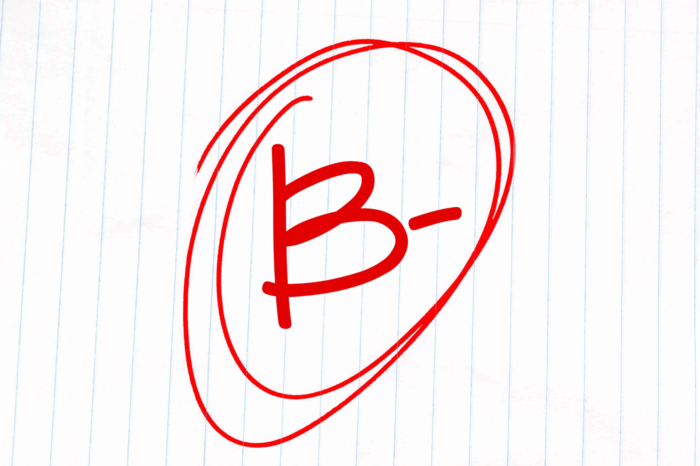Can low GPA (i.e. "B" students) get accepted into a top school?
The answer is a bit more nuanced than a hard "yes" or "no."
Are you a "B" student, or have you gotten B's?
Though these questions sound the same, their answers have very different consequences for the purposes of college admissions.
I went through every top university that reported the distribution of unweighted GPAs for its admitted students, and plotted them below.

The small black sliver at the top represents students with a “ B ” average or worse (3.0 GPA).
These are students with extremely extra-ordinary circumstances, so unless you have a building named after you or can throw a 95mph fastball, a “B” average is likely disqualifying. Thus, averaging a straight “B” is likely a death knell for top colleges.
All is not lost, however, if you generally do well in school but have a handful of B’s (e.g. a GPA between 3.6–3.8).
Having a lower GPA will require you to play your cards more thoughtfully, but you are still very much in contention for a spot at a top university.
Here are 5 tricks for making your application stand out despite a lower GPA.
1. Take more APs
Since they are graded on a 5-point scale, you can raise your weighted GPA to appear more in-line with a college’s admissions standards. The average weighted GPAs of Ivy League admits, shown in the USA Today chart below, is quite attainable:

2. Ace your standardized tests.
A high SAT or ACT score can help offset a lower GPA by demonstrating that you have the intellectual ability to perform at a high level.
3. Shine elsewhere in your application.
Your essays, for example, are a fantastic place to explain or indirectly shed light on personal circumstances that may have caused your lower GPA.
They also allow you to directly frame your application and convey why you — and only you — can add something uniquely meaningful to the incoming class.
As Logan Powell, Dean of Admissions at Brown University, writes:
“The essay is one of only two places where the student can tell us exactly who they are, in their own words (the other place is the interview).”
And Mitch Warren , Director of Admissions at Purdue University, adds:
"We receive about 54,000 applications from high school students each year, and despite that really large number, [the essay] truly is an individual and holistic review...[it] helps us to better understand the life of the applicant, especially things with grit, humor, motivation. I think also it helps tell stories that we may not have picked up on elsewhere in the application."
This is something that our Ivy League mentors specialize in.
4. Show an upward trajectory
If you got straight B’s freshman year but gradually worked your way up to consecutive semesters of straight A’s as a senior, then colleges will look much more favorably upon your transcript, as it demonstrates growth as a student.
As Dartmouth Assistant Director of Admissions Ariel writes,
[W]hen we review an applicant's transcript, we look at grade trends that will help us understand a student's academic trajectory in his or her secondary school.
We see transcripts that show steady grades throughout a student's high school career or a positive/upward trend from 9th-12th grade. We see transcripts where a student has bounced back from a transition or dip in grades. We also see downward trends in grades.
We use the rest of the application to try to fill in WHY the trend looks the way it does. If you have a particular reason for, say, a dip in grades in your junior year, please let us know about it in the "Additional Information" section of the Common Application.
Keep in mind that we will be looking to see how you have done in your most recent coursework since this will be a good indicator of how ready you are to move into a rigorous academic environment at Dartmouth.
5. Take the hardest classes offered
The negative impact of lower grades can be partially softened if they occurred while taking the hardest classes your school offers.
In the eyes of admissions officers, taking a rigorous course-load and challenging yourself, even if you do get a B or B+, can be equally as important as acing your classes.
An aside: These high GPA cut-offs are largely due to (1) increasingly high numbers of applicants and (2) rising grade inflation at the high school level.



